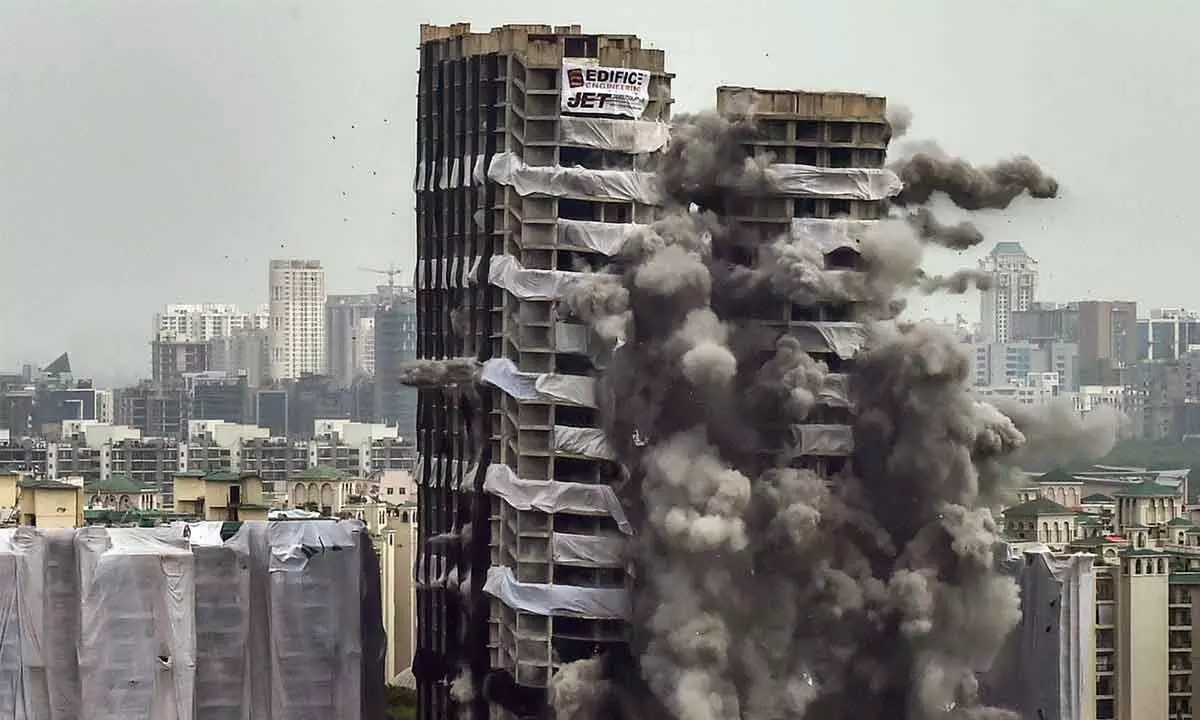800 cr gone with wind in 9 seconds
Supertech says construction made as per approval by Noida Dev Authority; Demolition of twin towers a lesson for all stakeholders, say industry experts
image for illustrative purpose

New Delhi: Realty firm Supertech on Sunday said the twin towers were constructed as per the building plan approved by Noida development authorities and no deviations were made.
"The Twin Towers Apex and Ceyane in Noida are a part of the Emerald Court project at Sector 93A constructed on land allotted by Noida authority. The building plans of the Project including the two towers were approved by the Noida Authority in 2009 which was strictly in accordance with the then prevailing Building Bye laws announced by the State Government," Supertech Ltd said in a statement. No deviation from the building plan was made and it was constructed after making full payment to the authority, it added.
"However, the Hon'ble Supreme Court has not found the construction satisfactory on technical grounds and accordingly issued orders to demolish the two towers. We respect the orders of the Apex Court and are committed to implement the same," Supertech said.
In August last year, the Supreme Court had ordered demolition of the twin towers, which have over 900 flats. On August 31 last year, the apex court directed that the entire amount of homebuyers has to be refunded with 12 per cent interest from the time of the booking and the Residents Welfare Association be paid Rs 2 crore for the harassment caused due to the construction of the twin towers. A bench of Justices D Y Chandrachud and M R Shah said the April 11, 2014 verdict of the Allahabad High Court, which directed demolition of twin towers, does not deserve any interference. The court had said the construction of Supertech's twin 40-storey towers having 915 flats and 21 shops was done in collusion with the Noida Authority and the high court was correct in holding that view.
Loss incurred by Supertech
The realty firm has incurred a loss of about Rs 800 crore, including construction and interest costs, because of the demolition of its twin towers in Noida, the company's Chairman R K Arora said.
The nearly 100-metre-tall twin towers - Apex and Ceyane - were demolished at 2.30 pm on Sunday as per a Supreme Court order that found their construction within Emerald Court premises in violation of norms. More than 3,700 kgs of explosives were used in this operation. The cost of the demolition itself is estimated at about Rs 20 crore. "Our overall loss is around Rs 500 crore, taking into account the amount we have spent on land and construction cost, the charges paid to authorities for various approvals, interest paid to banks over the years and the 12 per cent interest paid back to buyers of these two towers, among other costs," Arora said.
Supertech added that the demolition of these two towers will not impact its other real estate projects, which will be delivered to homebuyers.
What industry experts said?
Commenting on this development, leading property consultant Anuj Puri said: "The demolition of the twin towers is a lesson for all stakeholders concerned. The apex court has confirmed that if there are any violations, accountability will be fixed and going forward stakeholders will need to avoid any violations and remain within the purview of law."
Shishir Baijal, chairman and managing director, Knight Frank India, said it is a strong statement towards making real estate a transparent and responsible business segment. "We feel that developers and buyers will take cautionary notes and ensure that their projects are free of ambiguity and have all necessary clearances," he said. The top lesson from the demolition of the twin tower is that there is a continuous requirement for transparency in the sector.
"Actions like digitise land records available in public domain can help in further providing transparency. Further, RERA which has been implemented in different states with varying strengths, must be given more power to take punitive action against defaulters to protect the interest of end users," Baijal added.

